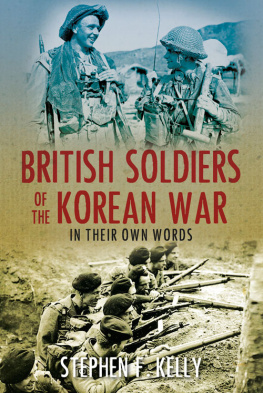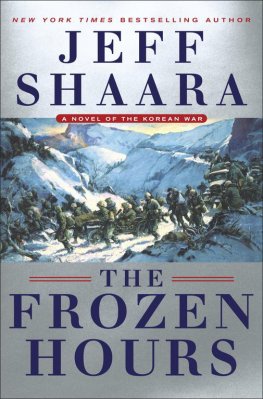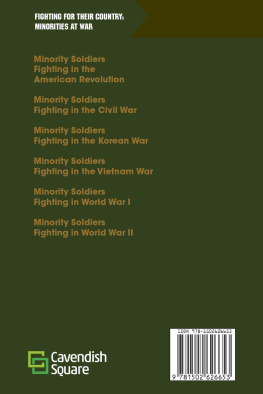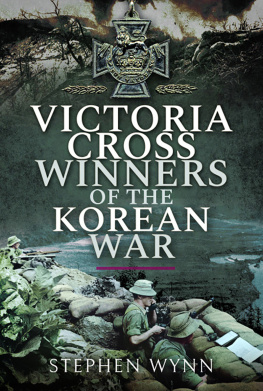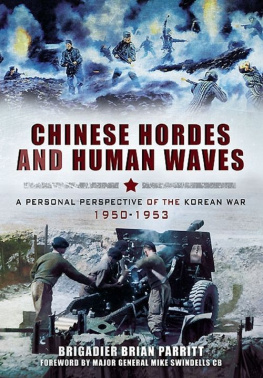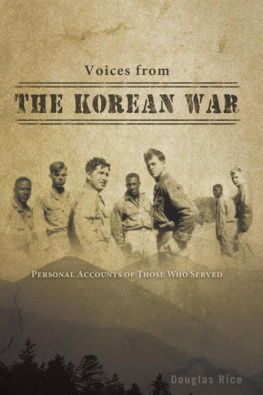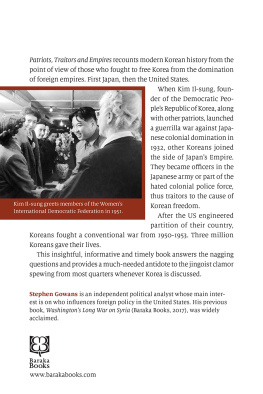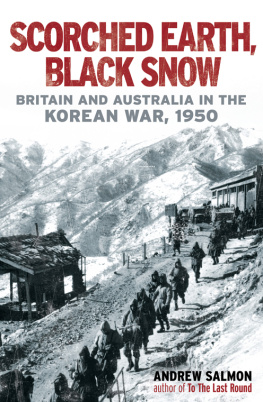
This book is dedicated to all the brave men (and women) who served in Korea and especially to those in this book.
THERE ARE NUMEROUS people I would like to thank for their help during the course of writing this book. First and foremost I owe a debt of gratitude to the British Korean Veterans Association. The Association cares for and organises events for all those in the armed services who fought in Korea. It does a magnificent job in keeping the memory of the war alive. But inevitably its numbers are now seriously dwindling as its old soldiers die off. All are now over the age of 80, many considerably older. Within another ten years the likelihood is that there will be only a handful of veterans remaining who played a part in the conflict. The purpose of my book has been to ensure that their memories and stories are not lost forever but remain for successive generations to read and understand the horrors they went through. Sue Hurst, secretary of the Veterans Association, and her husband Bill, were both helpful and enthusiastic in helping to find interviewees. I should also like to thank the various branches of the association who allowed me into their monthly meetings in order to try and find potential interviewees. Everyone was always courteous and helpful. There were, of course, some who chose not to be interviewed. Although it was disappointing that I could not record their memories I totally understand and respect their reasons for remaining silent.
Above all, however, I would like to thank all those I have interviewed. They all allowed me, a total stranger, into their homes, and happily plied me with tea and biscuits before settling down to recount their days in Korea. Their memories and their stories are quite remarkable. It could not have been easy for any of them. Many also lent me photographs and memorabilia, some of which appear in this book.
A small number of interviews and photographs have been taken from the Britains Small Wars website and I would sincerely like to thank them for giving me permission to use them. Their first-rate website is important and well worth viewing. I would also like to thank my publishers, The History Press, and in particular Shaun Barrington, who believed in this project from the start and who battled for its publication, and my editor Chrissy McMorris.
My gratitude and love, as ever, to my wife Judith, who has had to live with this project for more than a year but always remained interested in the tales I have recounted to her on returning from each interview. And to my children, Nick and Emma, thank you for just being around.
Stephen F. Kelly
Manchester
CONTENTS
IT HAS BEEN called the forgotten war. And with much justification. Today, few people remember the terrible conflict of the Korean War and even fewer men and women are still alive who served there between the years 1950 and 1953. Indeed people are still astonished to learn that British troops were even involved in the three-year conflict. Instead people associate the war with America; perhaps mainly because of the American produced television series MASH.
In 2012 we rightly remembered the 30th anniversary of the Falklands War with parades, commemorative services and acres of newsprint in our daily papers. In all, around 28,000 troops were sent to the Falklands with 255 British serviceman giving their lives, along with three Falkland Isles civilians and 649 Argentinians. And yet, when in 2010 Britain commemorated the start of the Korean War, there was little in the way of publicity or commemoration. Hopefully that will be rectified in July 2013 when Britain remembers the sixtieth anniversary of the ending of the war.
And yet the awful truth is that British troops, including the RAF and navy, were involved in an appalling conflict fought in atrocious weather conditions with many British troops taken prisoner by the Chinese and with the possibility of a nuclear attack being seriously planned by the Americans.
The statistics alone are startling. More than 100,000 British soldiers served in the war with 1,078 being killed. For the Americans it was even graver with over 300,000 soldiers involved and 40,000 killed. A further 2,000 soldiers also died from other countries serving with the United Nations. In all, fifteen nations sent troops as part of the UN command with America providing 90 per cent of the soldiers.
And that was only part of it. On the other side at least 350,000 North Korean troops were killed along with 150,000 Chinese troops and almost 300 Soviet soldiers. Civilian casualties are impossible to estimate but a figure of 2.5 million is probably a conservative guess. Much of Korea was destroyed. What cities there were lay in ruins with almost every building devastated by the incessant bombing, while the countryside lay peppered with craters from mortar attacks. Villages had been burnt down and the luscious vegetation destroyed by napalm bombs. That South Korea should resurrect itself into a mighty industrial nation within forty years, and act as host for the Olympic games, was indeed an economic miracle.
Perhaps most surprising of all to the layman is that the vast majority of British troops were conscripts; national servicemen, carrying out some of their two-year stint in Korea. Mostly they were teenagers, just 18, 19, 20-year-olds, straight off the streets of Glasgow, Manchester, Liverpool, London and elsewhere. As their eighteenth birthdays loomed they awaited the arrival of the letter telling them exactly where to go and enlist with some trepidation. Few imagined, however, that within a short period of time they would be heading for Hong Kong before being shipped to Korea. Even fewer seemed to have much idea of what the war was about, let alone where Korea was. None of them seemed to have even thought much about the politics. Why were we there, what was the point of fighting a war so many miles from home?
In fact, national servicemen were not supposed to be on the front line until they were 19 years old but there is plenty of evidence, not least from the testimonies in this book, to reveal some were clearly underage and should never have been there.
John Smith from Liverpool managed to beat the authorities twice. He had decided that he was going to sign on full-time as a soldier rather than wait for his national service call-up. But there was a problem. First, he was underage, only 17, but the army seemed to overlook that although its hard to believe that they didnt realise. And secondly, he signed up for the Argylls even though he had not been born in Scotland, nor had a Scottish parent. But he had set his heart on the Argylls and when he told the recruiting sergeant that it had to be the Argylls or nothing, the sergeant told him to put down that he had a Scottish father. And so, they signed him up.
The Korean War was very much the beginnings of a cold war that would last a further thirty years as relations between the West and the East became strained to breaking point. The Korean conflict ended in a stalemate that precipitated an even wider stalemate until the Berlin Wall was torn down in 1989. On the one side were the communist nations, headed by the Soviet Union and China with all their satellite allies, including North Korea, whilst on the other side were the United States, Britain and Western Europe.
The war fell into two distinct phases. The first phase, lasting roughly a year, was one of advance and retreat, north and south, with heavy casualties suffered by both sides. In the second phase after the summer of 1951, troops retreated to their trenches and bombarded each other. It became a stalemate with troops holed up defending their positions around the 38th Parallel. Not unlike the First World War, there was plenty of action but few territorial gains. Eventually both sides realised the futility of each others positions and a ceasefire was agreed, but not a permanent peace treaty.
Next page
